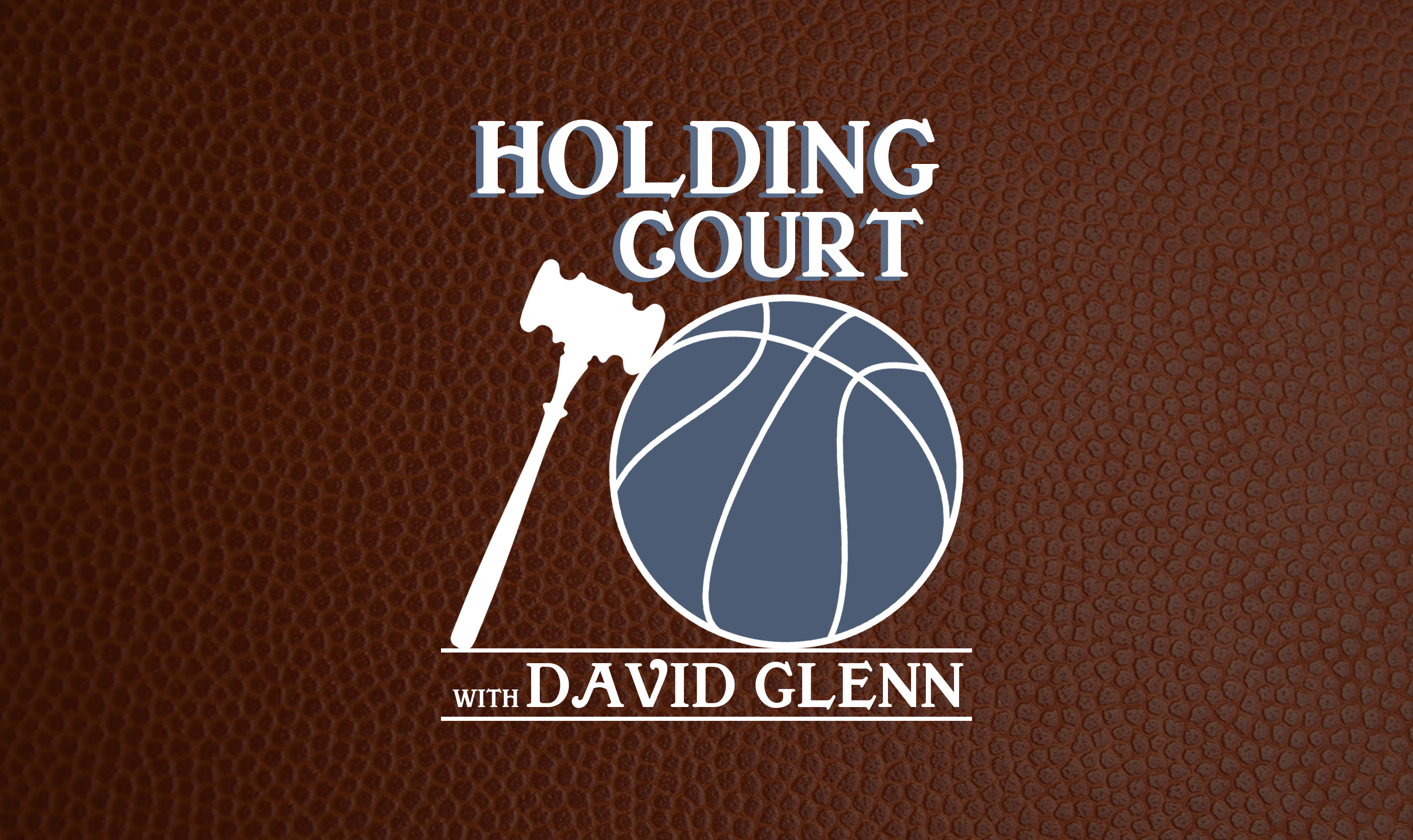Halfway Through Conference Schedule, Our 2023 Midseason All-ACC Snapshot
By David Glenn
Now that every Atlantic Coast Conference team is at or approaching the 10-game mark in the 20-game conference schedule, it’s time for a quick review and a midseason All-ACC snapshot.
First, overall, the league is not even close to its usual place as one of the top conferences. In most rankings, the ACC is sixth, behind the Big 12, Big Ten, Big East, SEC and Pac-12. There was a similar regular-season theme last year, of course, before the ACC advanced three teams (UNC, Duke, Miami) to the Elite Eight and the Tar Heels and Blue Devils to the Final Four.
The ACC has only three teams in the Associated Press Top 25: Virginia at #7, Miami at #20 and Clemson at #24. The Cavaliers (15-3) have the league’s best overall record, followed by the Tigers (17-4), Hurricanes (16-4), NC State (16-5), North Carolina (15-6), Duke (14-6) and Wake Forest (14-6). In conference play, the above-.500 teams are Clemson (9-1), UVa (7-2), Miami (7-3), UNC (7-3), Pitt (6-3), Wake (6-3), State (6-4), Syracuse (6-4) and Duke (5-4).
Through Monday’s games, the only top-25 teams in the national efficiency rankings were the following: #12 UVa, #18 UNC and #22 Clemson in the ELO rankings; #11 UVa and #24 UNC at KenPom.com; #14 UVa in the NET rankings; and #12 UVa, #19 Duke and #22 UNC in the RPI.
Individually, while there’s still plenty of time for the various pictures below to change, there are already clear-cut favorites for the ACC’s coach, player and freshman of the year honors.
Coach of the Year
Brad Brownell, Clemson
Clemson is the only original member of the almost 70-year-old ACC that has never won a conference championship in men’s basketball. Moreover, the Tigers have finished first in the league standings only once — in 1990, under coach Cliff Ellis (now 77 and Coastal Carolina’s head coach), when future NBA big men Elden Campbell and Dale Davis were the team’s stars.
Brownell, 54, is in his 13th season at Clemson, after successful four-year tenures at UNC Wilmington and Wright State. Although the Tigers have made only three NCAA Tournament trips under Brownell, their 2018 campaign (25-10, 11-7 ACC, Sweet 16) on his watch ranks among the three or four greatest seasons in program history.
At 17-4 and 9-1 in conference play so far this season, Clemson sits atop the ACC standings and is ranked in the national Top 25, a status they’ve achieved in the final/postseason polls only six times in history. The Tigers have posted impressive road victories against Pittsburgh and Virginia Tech, and they have beaten (among others) Duke, NC State, Wake Forest and the Hokies at Littlejohn Coliseum. Their best nonconference win is over Penn State.
Amazingly, the Tigers, winners of nine of their last 10 games, have achieved this success despite many complications. First, they lost four of their top seven players from last year’s 17-16 squad, including all three starting guards. Second, unlike most ACC teams, they are not relying much on the portal; there is only one transfer, sixth-year guard Brevin Galloway, in the Tigers’ nine-man rotation. Finally, the team’s most accomplished player, junior forward PJ Hall, is playing reduced minutes after enduring foot (spring) and knee (summer) surgeries in 2022, and senior guard Alex Hemenway, another starter, has missed nine straight games with a foot injury.
For now, Ellis (who won in 1987 and 1990) remains the only Clemson coach ever to receive the ACC coach of the year honor. With a first-place finish, Brownell should and would be an absolute lock to win the award this season. Even without a regular-season championship, barring a second-half collapse, he’d likely rank among the top contenders.
Other potentially viable candidates in March: Jeff Capel, Pitt; Tony Bennett, UVa; Jim Larranaga, Miami; Kevin Keatts, NCSU.
Player of the Year
Armando Bacot, Sr., center, North Carolina
Now in his fourth full season as the Tar Heels’ starting center, Bacot gradually has become the best combination of production, consistency, experience, leadership and intangibles in the ACC.
This season he’s among the ACC leaders in scoring (18 ppg, third), rebounding (12 rpg, first), field goal percentage (58%, third) and blocked shots (1.1 bpg, 10th). A team captain since last season, he’s smart, poised, gritty, relentless and virtually unflappable under pressure.
“The way that he’s improved, the way that he works, the way that he leads is something that you want as a coach,” UNC coach Hubert Davis said. “You want to be able to come to the gym and know what you’re getting, and from Armando 100 percent you know what you’re getting … He’s one of the best players in Carolina history, and I’m just really, really proud of him.”
Underlining Bacot’s immense value to Carolina is the team’s performance with and without him, especially after the shaky start that caused the preseason #1 Tar Heels to drop out of the Top 25 entirely. Since November, UNC is 10-1 when Bacot plays and 0-2 when he doesn’t; he missed the entire Virginia Tech game and all but one minute of the Virginia game with injuries.
Last season, Bacot received 31 votes for ACC player of the year but finished as the runner-up to Wake Forest senior guard Alondes Williams (41 votes). This season, there does not appear to be a similar challenger on the horizon, although that certainly could change if any of the players/teams below truly dominate during the second half of the conference schedule.
Other potentially viable candidates in March: Kyle Filipowski, Duke; Terquavion Smith, NCSU; Tyree Appleby, Wake Forest; Hunter Tyson, Clemson.
First-Team All-ACC
- Armando Bacot, Sr., center, North Carolina
- Kyle Filipowski, Fr., forward, Duke
- Terquavion Smith, So., guard, NC State
- Tyree Appleby, Sr., guard, Wake Forest
- Hunter Tyson, Sr., forward, Clemson
On the 15-man midseason All-America team announced recently by The Sporting News, there were only two ACC players: Bacot (second team) and Smith (third team). Filipowski (see below) is among the nation’s top freshmen. Smith, who might have been a first-round NBA pick last year, remains an elite scorer (ACC-best 19 ppg) and has improved his passing and defense. Appleby, a solid performer at Florida, has become yet another elite transfer for the Demon Deacons and ranks among the ACC’s leaders in scoring, assists and steals. Tyson, who is averaging a double-double (16 ppg, 10 rpg), is among the league’s most improved players.
Second-Team All-ACC
- Reece Beekman, Jr., guard, Virginia
- Isaiah Wong, Sr., guard, Miami
- RJ Davis, Jr., guard, North Carolina
- Jamarius Burton, Sr., guard, Pittsburgh
- Norchad Omier, Jr., forward, Miami
Although his raw numbers are depressed by UVa’s very slow tempo, Beekman is an extremely efficient offensive player and among the frontrunners for ACC defensive player of the year. Wong is an elite scorer who has rediscovered his 3-point shooting and dramatically improved his passing. A rugged, scrappy, fiercely competitive, high-IQ ballhandler and sharpshooter, Davis is the heart and soul of the Tar Heels. A big-time scorer, Burton has led Pitt’s emphasis on unselfish, team-first play with smarter shot selection and better playmaking. The Sun Belt player of the year at Arkansas State last season, Omier is a reliable points producer who ranks among the ACC’s leaders in field goal percentage, rebounds and blocked shots.
Third-Team All-ACC
- Kihei Clark, Sr., guard, Virginia
- Jarkel Joiner, Sr., guard, NC State
- Sean Pedulla, So., guard, Virginia Tech
- PJ Hall, Jr., forward, Clemson
- Jesse Edwards, Sr., center, Syracuse
Clark, long one of the ACC’s top defenders and assist/turnover magicians, has improved his 3-point shooting stroke and offensive productivity. A mentally and physically tough Ole Miss transfer, Joiner is a sixth-year point guard who’s a high-end scorer and strong ballhandler. A feisty, uber-competitive point guard, Pedulla (from 5 ppg to 16 ppg) may be the most improved player in the conference. Still recovering from two serious injuries/surgeries in 2022, Hall is absolutely making the most of his limited minutes. An efficiency machine, Edwards is a high-percentage shooter and elite shotblocker who averages a double-double (points/rebounds).
Other potentially viable candidates in March: many (see graphic).
Freshman of the Year
Kyle Filipowski, forward, Duke
In what so far has been a strange, subpar year for ACC freshmen overall (see below), Filipowski has come up big — literally and figuratively — for the Blue Devils.
A 7-0, 230-pounder who’s listed as a center on the official Duke roster, Filipowski has perimeter skills much more common in forwards, unlike the Devils’ other four centers. While not a strong 3-point shooter (29 percent), he is comfortable facing the basket and juking or spinning past his defender off the dribble to attack the hoop, an uncommon trait among collegiate 7-footers.
At the same time, Filipowski doesn’t neglect his around-the-rim responsibilities. Duke’s leader in scoring (16 ppg), rebounding (10 rpg), free throws (81-104, 78%) and steals (25), he ranks among the ACC’s top five in offensive rebounds, defensive rebounds and total rebounds.
In November and early December, Filipowski became the first player in ACC history to begin his career with four straight ACC rookie of the week awards, and his six such honors overall are more than those of all other current ACC freshmen combined. His 29-point, 10-rebound effort Monday at Virginia Tech gave him 10 double-doubles, most among freshmen nationally.
Other potentially viable candidates in March: none.
ACC All-Freshman
- Kyle Filipowski, forward, Duke
- Judah Mintz, guard, Syracuse
- JJ Starling, guard, Notre Dame
- Mark Mitchell, forward, Duke
- Tyrese Proctor, guard, Duke
One byproduct of the transfer portal, in the ACC and elsewhere, is that fewer incoming high school players are getting significant playing time. In fact, only eight ACC freshmen (starting with the five listed above) are averaging more than 20 minutes per game, which means the rest are watching more than they’re playing — usually a lot more. At this point, only Filipowski, Mintz and perhaps Starling have been truly efficient, high-impact newcomers, although Mitchell, Proctor and other rookies have played better recently than they did in 2022.
Other potentially viable candidates in March: Louisville guard Michael James; UVa guard Isaac McKneely; SU forward Maliq Brown; SU forward Chris Bell; FSU forward Cameron Corhen; Duke forward Dariq Whitehead (injured); Duke center Dereck Lively II, BC forward Prince Aligbe.
(featured image via Todd Melet)
 David Glenn (DavidGlennShow.com, @DavidGlennShow) is an award-winning author, broadcaster, editor, entrepreneur, publisher, speaker, writer and university lecturer (now at UNC Wilmington) who has covered sports in North Carolina since 1987.
David Glenn (DavidGlennShow.com, @DavidGlennShow) is an award-winning author, broadcaster, editor, entrepreneur, publisher, speaker, writer and university lecturer (now at UNC Wilmington) who has covered sports in North Carolina since 1987.
The founding editor and long-time owner of the ACC Sports Journal and ACCSports.com, he also has contributed to the Durham Herald-Sun, ESPN Radio, the New York Times, the Washington Post, Raycom Sports, SiriusXM and most recently The Athletic. From 1999-2020, he also hosted the David Glenn Show, which became the largest sports radio program in the history of the Carolinas, syndicated in more than 300 North Carolina cities and towns, plus parts of South Carolina and Virginia.
Chapelboro.com does not charge subscription fees, and you can directly support our efforts in local journalism here. Want more of what you see on Chapelboro? Let us bring free local news and community information to you by signing up for our biweekly newsletter.



